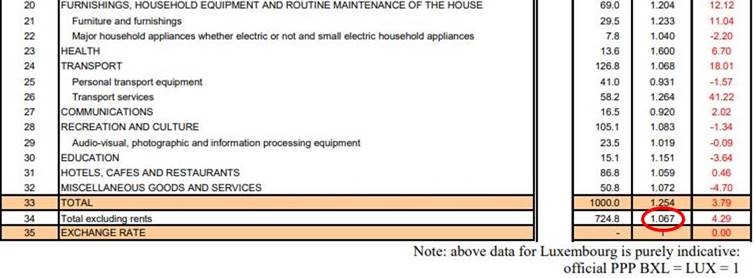| Union Syndicale Luxembourg wishes to draw attention to the continuing deterioration in the purchasing power of EU officials and staff assigned to Luxembourg and to denounce the difficulties relating to the attractiveness of the Luxembourg site, which have been noted for several years and which have an impact on the recruitment capacity of the European Union institutions in Luxembourg, on the permanence and long-term staying of those already working there, and contribute to the increased contractualisation of employment.
This deterioration is cross-cutting and affects practically all components of the statistical basket of expenditure, and therefore not only housing. The disparities in purchasing power between officials in different places of employment are not new, nor are they unique to Luxembourg. The cost of living in the EU and world capitals where EU staff live and work varies from year to year. Aware of this economic reality, the Union has included in the Staff Regulations a dedicated instrument, the Correction Coefficient. The disparity in purchasing power in relation to Brussels is calculated every year for Paris, Berlin, Madrid, Rome, Warsaw and all other places of employment on the basis of a methodology, also used by the OECD and the “Coordinated Organisations” (ESA, NATO, etc.), which is also detailed in the Staff Regulations and whose guardian is Eurostat. And if this disparity exceeds the 5% threshold, a correction coefficient is applied everywhere in the world… except in Luxembourg! In 2021, the Eurostat study showed that the disparity in purchasing power between Luxembourg and Brussels (25,4%) exceeded the 5% threshold even when housing was excluded from the calculations! Almost all categories of expenditure, with a few exceptions (tobacco, alcoholic beverages and communications) exceed the parity of 1, which explains why, even if we disregard housing, staff assigned to Luxembourg are discriminated against in their everyday life and for almost all consumer goods. Indeed, if the total disparity calculated by Eurostat of 25.4% will inform NATO and EFTA for the adjustment of the salaries of their agents based in Luxembourg, another figure deserves attention: that of 6.7%, which represents the difference in the cost of living between Luxembourg and Brussels when the “housing” factor is removed from the calculation. However, it would be sufficient for an anachronistic provision of the Staff Regulations to be corrected by means of a Delegated Act, a power which the Commission has, to create or withdraw correction coefficients (cf. Article 112 of the Staff Regulations of the ECS and 9 of its Annex XI), and this at any time without jeopardising the economy of our Staff Regulations. |

